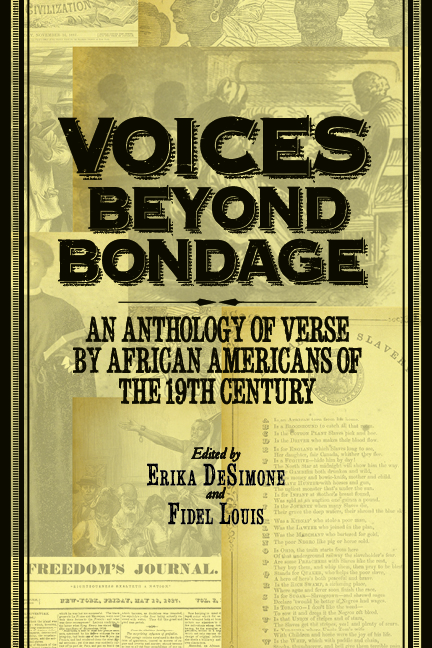 A Huffington Post blog entry by Erika DeSimone spotlights Voices Beyond Bondage: An Anthology of Verse by African Americans of the 19th Century, co-edited by DeSimone and Fidel Louis and recently released by NewSouth Books. In the blog post, “The Literary Movement America Forgot,” DeSimone shares her insights into “history-through-omission,” which developed while she and Louis were researching the book.
A Huffington Post blog entry by Erika DeSimone spotlights Voices Beyond Bondage: An Anthology of Verse by African Americans of the 19th Century, co-edited by DeSimone and Fidel Louis and recently released by NewSouth Books. In the blog post, “The Literary Movement America Forgot,” DeSimone shares her insights into “history-through-omission,” which developed while she and Louis were researching the book.
She writes:
As we groped through countless reels of microfiche and exhumed hundreds of poems, we came to more fully understand the rich cultural and literary heritages of African Americans, heritages that have largely been subsumed in popular history by the horrific reality of slavery in America and our shameful race-based human chattel bondage system.
Omission-history tells us that slavery was the only identity of African Americans in the 19th century, but this is not the case. Relatively sizable populations of free African Americans existed in cities like New York and Boston, while smaller communities dotted the landscapes of Border States, the northeast, and America’s territories. And, of course, not all southern African Americans were enslaved. But while these people were sadly, inarguably marginalized, often wholly invisible to society at large and for the most part completely segregated from Anglo society, they were not universally without resources or voice.
In 1827 the efforts of three freeborn New York City African American clergymen — Samuel E. Cornish, John B. Russwurm, and Peter Williams Jr. — birthed the nation’s first black-owned and operated newspaper. When Freedom’s Journal hit the newsstands, it marked the first moments of an unprecedented revolution in American media. As the sole black-controlled publication in the nation, this four-page weekly was the first to focus on content of interest to African American communities (something woefully absent from mainstream media) and was refreshingly, blissfully, free of the usual clutter of socially demeaning ads. Although initial circulation was small, the Journal was lauded by the abolitionist/liberal media for its fine reporting and touched off what would become a veritable maelstrom of black-owned presses to follow.
Perhaps what is most surprising about Freedom’s Journal is not merely its existence in an era of such segregation, but that the paper — which had no shortage of topics to cover — reserved in every issue an open-call column for poetry, thereby creating and nurturing a creative space for African Americans, making the Journal truly the voice of its readership.
Read Erika DeSimone’s full essay in the Huffington Post.
Voices Beyond Bondage: An Anthology of Verse by African Americans of the 19th Century is available from NewSouth Books, Amazon, or your favorite bookstore.
